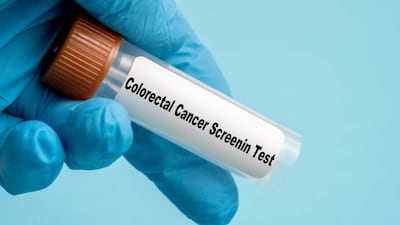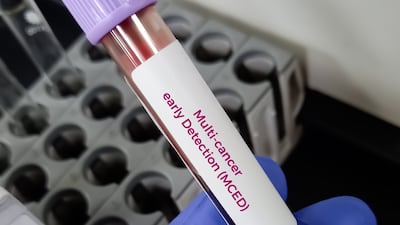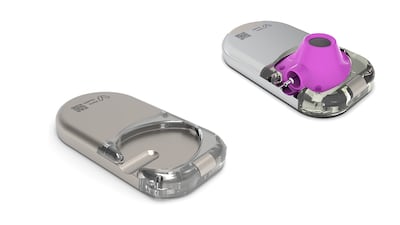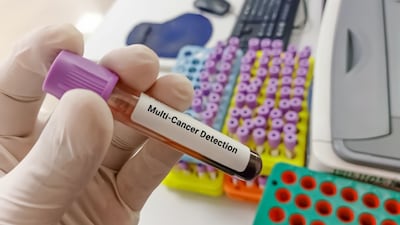Oncology
Molecular diagnostics firm SAGA Diagnostics has introduced a colorectal cancer test that can detect even very low levels of cancer biomarkers. The test helps clinicians guide post-surgical treatment decisions.
A pair of diagnostic developers backed with venture capital have teamed up with the University of Tennessee to fight colorectal cancer. The collaboration seeks to advance next generation testing to catch one of the deadliest cancers in its earliest stages.
Freenome will combine with Perceptive Capital Solutions Corp in a SPAC deal worth $330m. The goal is to advance Freenome’s blood-based tests for early detection of cancer and, in 2026, launch its advanced colorectal cancer detection test SimpleScreen, currently under FDA review.
Medtech funding in 2025 sees a trend of fewer, yet larger deals with total funding of $3.6bn in Q1, $2.6bn in Q2 and $2.9bn in Q3, said LSI’s Nick Talamantes. In 2026, he expects a continued investor focus on more mature firms in areas of oncology, cardiology and neurology.
Ahead of Exact Science’s $21bn dollar acquisition by Abbott, Medtech Insight spoke to the company’s chief medical officer, Tomasz Beer, to learn more about the company’s multi-cancer early detection offering, its wider portfolio of products and to hear more about the direction of the field.
A recent study demonstrates that certain types of blood-based tests that screen for multiple cancers at once have the potential to flip the script on cancer diagnoses, including some of the deadliest types.
Entering the liquid biopsy market with a new technology remains challenging. Rarity Bioscience CEO Linus Bosaeus, is confident his company’s superRCA could help unlock the true potential of precision medicine as pharma looks more to minimal residual disease as an oncology endpoint.
Abbott will acquire Exact Sciences for $21bn, which marks the largest such deal ever in the diagnostics space. The deal will allow Abbott to enter the fast-growing $60bn US cancer screening market.
Brain-computer interfaces advance toward trials and commercialization, Oura pushes for FDA-cleared blood pressure monitoring, and regulators weigh AI’s expanding role in mental health and diagnostics amid rising safety concerns.
Viome’s CEO To Expand Into Clinical Diagnostics ‘For Which There Are No Solutions’ With AI, RNA Test
Viome Life Sciences accelerates its push into clinical diagnostics with studies in colorectal cancer and a major partnership with Microsoft to scale its molecular data analysis platform. Viome leverages RNA analysis and AI to detect disease at the molecular level and personalize preventive health.
Delfi Diagnostics is preparing for pivotal trial results that could support FDA approval and reimbursement for its fragmentomics-based lung cancer screening test. Early data suggest strong potential to improve screening uptake and expand access to early detection.
Inspired by his son’s battle with cancer, Neal Piper founded Luminoah to modernize enteral feeding. Its smart, pocket-sized pump tracks nutrition in real time to prevent malnutrition and improve quality of life for patients and caregivers.
Astrin Biosciences To Launch First Blood-Based Test For Early Breast Cancer Detection, Dense Breasts
Astrin Biosciences will debut Certitude, a proteomics-based blood test for women with dense breasts, aiming to detect early breast cancer with MRI-like accuracy and outperform current supplemental imaging.
Banking on new billing codes for remote services, PAVmed’s Veris Health is expanding its oncology remote monitoring platform with Ohio State’s cancer center and developing an implantable physiological monitor to provide clinicians with continuous insights between treatment visits.
The $250m in new funding from HistoSonics’ new owners and new investors Thiel Bio and Founders Fund will expand its histotripsy platform globally, advance new indications, and scale operations. CEO Mike Blue tells Medtech Insight that an IPO isn’t an immediate priority.
Excitement surrounds Multi Cancer Early Detection testing for diagnosing hard-to-detect cancers early and improving patient outcomes. But without full randomized trials – only accuracy studies – physicians lack enough evidence to use them confidently, said physician and researcher Daniel Jonas.
Family offices, impact funds, and public-private partnerships are among alternative approaches to financing that stress early-stage investment, collaboration, impact and health equity – but not, at least for family practices, AI.
At the MedTech Conference, the CEOs of Stryker, Hologic and Insulet said during a panel AI is now central to their business strategies, from creating new medical devices to streamlining workflows and administrative tasks. Stryker’s CEO Kevin Lobo plans a business unit focused on AI-enabled tech.
Resitu Medical has received FDA 510(k) authorization for the RESL09 breast cancer biopsy device. This handheld minimally invasive device excises tissue samples with diameters up to 9 mm and will first reach market in the US. The company plans to expand the tool’s clinical claims and core size range.
The Nancy Gardner Sewell MCED Act has advanced in the US House, potentially allowing Medicare coverage for multi-cancer early detection tests. Exact Sciences is targeting FDA approval for its MCED test Cancerguard, launched in the US earlier this month.




















